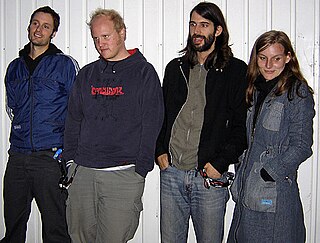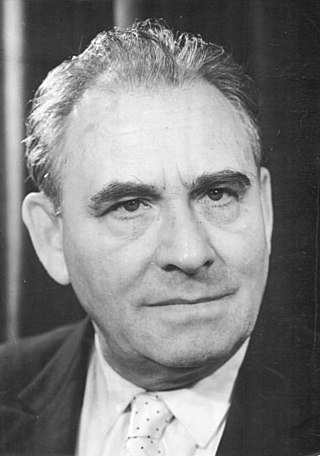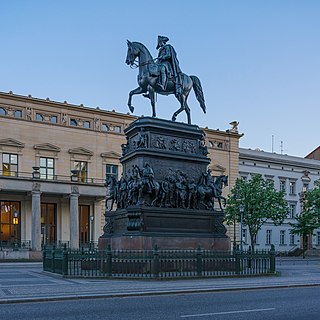Neue Deutsche Welle is a genre of West German rock music originally derived from post-punk and new wave music with electronic influences. The term was first coined by Dutch radio DJ Frits Spits on the popular nationwide radio station Hilversum 3, which was very popular among German listeners. Soon after that, the term was used in a record-shop advertisement by Burkhardt Seiler in an August 1979 issue of the West German magazine Sounds. It was then used by journalist Alfred Hilsberg in an article about the movement titled Neue Deutsche Welle — Aus grauer Städte Mauern in Sounds in October 1979.

Wir sind Helden was a German pop rock band that was established in 2000 in Hamburg and based in Berlin. The band was composed of lead singer and guitarist Judith Holofernes, drummer Pola Roy, bassist Mark Tavassol and keyboardist/guitarist Jean-Michel Tourette.

Erik Ode was a German director and actor who was most famous for playing Kommissar Herbert Keller in the German television drama Der Kommissar. He married actress Hilde Volk in 1942. Many years later they co-starred together in the TV series Sun, Wine and Hard Nuts.

Joachim Prinz was a German-American rabbi who was an outspoken activist against Nazism in Germany in the 1930s and later became a leader in the civil rights movement in the United States in the 1960s.

Carl Friedrich Freiherr von Langen was a German horse rider who competed in the 1928 Summer Olympics.

David Hirsch, known as Wolfgang Heinz, was an Austrian and East German actor and theater director. He served as President of the Academy of the Arts in Berlin between 1968 and 1974.

Joachim Ernest of Anhalt, was a German prince of the House of Ascania, ruler of the principality of Anhalt-Zerbst from 1551, and from 1570 sole ruler of all the Anhalt lands.

The discography of Oomph!, a German rock band, often considered to be the original Neue Deutsche Härte musical group, consists of fourteen studio albums and one video album. Oomph! has also released twenty-three singles. The band was formed in mid-1989 by three musicians from Wolfsburg: singer/drummer Dero Goi, guitarist/programmer Andreas Crap and guitarist/bassist/programmer Robert Flux.

Wolfgang Neuss was a German actor and Kabarett artist. Wolfgang Neuss and Wolfgang Müller (1922–1960) were a popular double act. Beginning in the mid-1960s, Neuss also became famous for his political engagement, first for the SPD, then for the extra-parliamentary opposition, APO. He died in 1989 from a longtime cancer.

Caren Miosga is a German journalist and television presenter.

The equestrian statue of Frederick the Great on Unter den Linden avenue in Berlin's Mitte district commemorates King Frederick II of Prussia. Created from 1839 to 1851 by Christian Daniel Rauch, it is a masterpiece of the Berlin school of sculpture, marking the transition from neoclassicism to realism. The bronze statue shows "The Old Fritz" dressed in military uniform, ermine coat and tricorne hat on horseback above the leading generals, statesmen, artists and scientist of his time. Walled in during World War II, it was disassembled by East Germany in 1950, reassembled in Sanssouci Park in 1963, and returned to its original location in 1980.

Mathilde Danegger was an Austrian stage and movie actress. Sources may also identify her by the pseudonym, Mathilde Leusch; Leusch is apparently a variant of her second husband's surname (Lesch).
Karl Heinz Schwab, known professionally as Ralf Bendix, was a German Schlager singer, music producer, composer and songwriter.
TAKT is a group of writers and composers of new songs for use in Christian churches, initiated in 1947. The genre which the members promoted was later called Neues Geistliches Lied. The name is short for TextAutor/innen- und Komponist/innen-Tagung, a name that the group adopted in 1997.

Joachim Philipp Maria Meyerhoff is a German actor, director, and writer.

Tobias Clausnitzer was a German Lutheran pastor and hymn writer.

Martin Kunzler is a German jazz bassist and music journalist. He gained particular fame through his rororo Jazz-Lexikon published by Rowohlt Verlag, which is now considered the standard German-language work on this musical genre.

Don't Look at Me That Way is a 2015 German feature film directed by Uisenma Borchu, who also wrote the script and starred in the film. The film had its world premiere at the 33rd Filmfest München in the category "Neues Deutsches Kino". It is considered an overwhelming feature film that provocatively questions gender roles and is about an erotic power struggle between two young city women.
Andre Asriel was an Austrian-German composer.
This page is based on this
Wikipedia article Text is available under the
CC BY-SA 4.0 license; additional terms may apply.
Images, videos and audio are available under their respective licenses.














